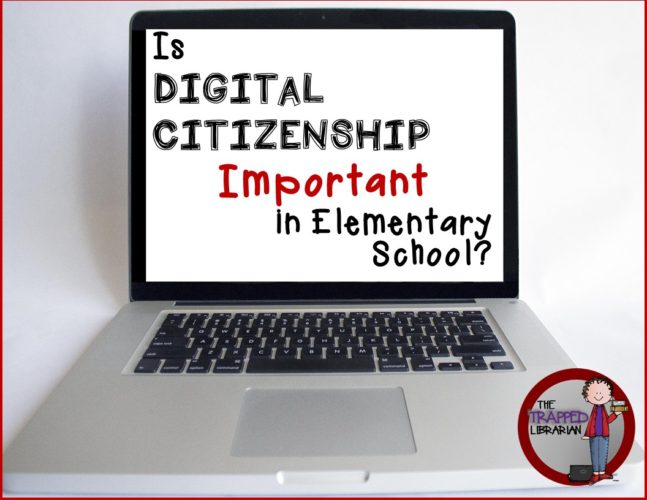Last Updated on October 25, 2020 by Laura

I am passionate about students connecting with other students, near and far. We are so fortunate to live in a time when the Internet makes that not just possible, but downright easy! Along with all of the wonderful possibilities, of course, come some downfalls, or dangers, that the World Wide Web brings. Because of both the pros and cons, I give a resounding YES to answer the question of whether our youngest learners need to learn the principals of digital citizenship.
I recently read the book Digital Citizenship: A Community Based Approach by Susan M Bearden. In this short handbook, Bearden exjplains several areas of digital citizenship and then gives strategies to use to help your students, staff, and parents understand the possibilities and pitfalls we all face in this digital age. In keeping with Bearden’s guidelines, I suggest 7 reasons why our elementary students need to learn about digital citizenship.
- Students need to understand how to be SAFE on the Internet. Revealing too much personal information can leave them vulnerable to predators, identity thieves, & other criminals. They need to know how to handle ANY online situations that make them feel uncomfortable. Students should know how to balance the risks with the rewards of collaborating and communicating beyond the classroom.
- Students need to understand about PRIVACY & SECURITY. Viruses, malware, spam, phishing, targeted advertising and data mining are realities that we can help them understand and manage. They need to know that Internet browsing & cell phone use present privacy risks. We can teach them about customizing privacy settings & how to opt out of 3rd party sharing.
- The Internet provides endless opportunities for RELATIONSHIPS & COMMUNICATION. Students can and should know how to share their work with a world wide audience. They also need to know how to handle differences of opinions in online spaces. We can help them navigate communication online and help them understand how written words are easily misinterpreted without body language. They can learn how to handle differences of opinions in online spaces.
- Our students’ DIGITAL FOOTPRINTS & REPUTATION can impact future opportunities such as college admission and job prospects. This process has likely already begun with their parents sharing baby pictures in social media online. We can help them understand how to take control and create a positive digital footprint.
- The Internet has a great influence on our students’ SELF IMAGE & IDENTTY. Children are influenced by media – how they think they should look, act, etc. They need to understand that an online portrayal is not “real life.” We can also help them understand that content posted online can leave them vulnerable to cyberbullying.
- We can help our students develop strong INFORMATION LITERACY skills. The latest emphasis on fake news has helped us to realize that we live in an age of information overload: students need to know how to sift through all of it to find what is accurate and valuable. They need to be aware of Internet marketing and how it influences their online search results. We can help them understand things like sponsored links and browser cookies, and how to get around these controls
- Now, more than ever, our students need to understand CREATIVE CREDIT & COPYRIGHT. Digital resources make it so easy to use text, photographs, music, etc., so our students must understand the ethical use of digital resources. An important aspect of this learning is for our students to see themselves as content creators as well, and to understand their rights as such.
So for me the question isn’t “Is digital citizenship important in elementary school?” but rather, “What are you doing to develop digital citizenship skills in your students?”
In the meantime, share your ideas below – do you teach your elementary students about digital citizenship? If you do, what’s your biggest reason for saying “YES!”? Do you have any good resources to share?
Be the light!


